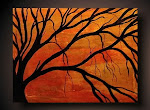Magic Workers in Northern Paganism
Publicada por
Arith Härger
/ 2:18 AM /
Since childhood we have heard about those who work with magic, in stories, fairy tales, books, movies etc. about wizards, sorcerers, prophets and so on. In this post i will give you some examples and names that you might hear or read when searching for lore or academic material concerning the northern european traditional ways of magic, rune-reading, witchcraft and such, in this way you will get use to those names and you won't be lost when you encounter them.
Europeans have always been people really close to the magic arts, this may sound like something taken out from a fantasy book, but when i mean magic, i am referring to those who practiced shamanism or any other form of tribal spirituality and divination, or those who worked with herbs and drugs in terms of healing the body or to induce trance. The first word one might hear or read a lot when searching for the Norse lore and people who practiced these things is the word "Völva" the name given to a prophetess, there are many women with such title in the lore, in the sagas especially in the Völuspá. Another word ( not so much heard ) is "Thul" the title used to for "wiseman" a sage or a bard, a person with the gift of singing and with the gift of words, a very eloquent person, who uses those gifts to tell or sing stories of truth, with morality and warnings, with wisdom and also a person who describes the lineage of kings and heroes, having great knowledge in the matter. The word Seiðr or Seidhr is a very common word to hear about, used to describe those who practice the old ways, the traditional shamanism of the northern peoples of Europe and in this field, women were the ones to prectice it, they were called seiðkona or spákona, there were also men who practiced it, but since seiðr was always closely associated with women and the female gender, men who were caught practicing these things could be outraged, insulted, reviled and even sentenced to death, but these men where called seiðmadhr or spámadhrmadhr. There is also a title for the wizard, those famous men filled with wisdom and knowledge in the magic arts, the title is "vitki". For those who read runes and are the rune masters, the title is "rúna-meistari" and also "galdra-meistari" or "galdra-kona" for a man or woman who uses spells. There are also those who deal with the black arts which are called "fjölkunning" and those who work with mysterious and sinister spirits and wights who are called "trollkjerring" however, these titles are not often used nor often seen in the lore.
The general term for magic in the old norse or the term refering to norse magic is "gand" this is the closest we can get, a term associated with magic workers, magical beings linked to the person who practices magic and also objects used for magic. The word for spell or song is "Galdr" this word may also be refering to items, objects to practice magic, since people had to use them to chant a spell, and this term is also used in such mater because spells were sung in a high voice, very much verbal.
So these are a few words you might encounter when studying the Norse lore and the old ways of spirituality.
Note: If you have any questions for me or if you want to see my artistic works, check out my Facebook page and make a Like if you can by following this link --> http://www.facebook.com/ArithHarger
em 2:18 AM | Keywords: About Shamanism, fjölkunning, Galdr, Gand, Northern Pagan Traditions, rúna-meistari, Seidhr, seiðkona, seiðmadhr, Seiðr, Thul, trollkjerring, vitki, Völuspá, Völva, witchcraft, witiga, wizards





0 comentários:
Post a Comment